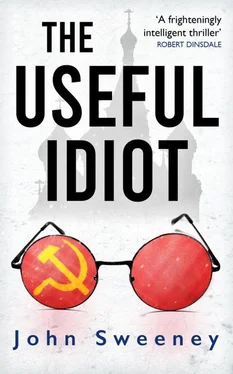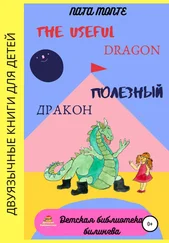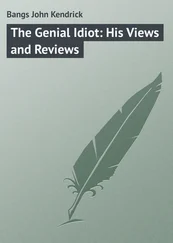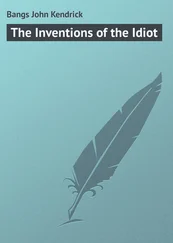John Sweeney - The Useful Idiot
Здесь есть возможность читать онлайн «John Sweeney - The Useful Idiot» весь текст электронной книги совершенно бесплатно (целиком полную версию без сокращений). В некоторых случаях можно слушать аудио, скачать через торрент в формате fb2 и присутствует краткое содержание. Город: London, Год выпуска: 2020, Издательство: Silvertail Books, Жанр: Исторический детектив, Триллер, на английском языке. Описание произведения, (предисловие) а так же отзывы посетителей доступны на портале библиотеки ЛибКат.
- Название:The Useful Idiot
- Автор:
- Издательство:Silvertail Books
- Жанр:
- Год:2020
- Город:London
- ISBN:нет данных
- Рейтинг книги:4 / 5. Голосов: 1
-
Избранное:Добавить в избранное
- Отзывы:
-
Ваша оценка:
- 80
- 1
- 2
- 3
- 4
- 5
The Useful Idiot: краткое содержание, описание и аннотация
Предлагаем к чтению аннотацию, описание, краткое содержание или предисловие (зависит от того, что написал сам автор книги «The Useful Idiot»). Если вы не нашли необходимую информацию о книге — напишите в комментариях, мы постараемся отыскать её.
* * *
The Useful Idiot — читать онлайн бесплатно полную книгу (весь текст) целиком
Ниже представлен текст книги, разбитый по страницам. Система сохранения места последней прочитанной страницы, позволяет с удобством читать онлайн бесплатно книгу «The Useful Idiot», без необходимости каждый раз заново искать на чём Вы остановились. Поставьте закладку, и сможете в любой момент перейти на страницу, на которой закончили чтение.
Интервал:
Закладка:
And unofficially? None of these achievements squared with the dull-eyed beggars from the countryside pleading for bread, most of them pathetically polite and all of them pitifully thin. The ordinary Muscovites queueing outside the food shops from the night before in weather so cold it made your head ache. The corpses in the snow.
In his four months in Russia, a succession of brilliant minds had arrived from the West to bend the knee to Soviet planning. Jones didn’t know what to think. There were times the solution was simple: to stop trying to wrestle with the two realities – the official text against the unofficial fact – and just go with the flow. That was easier than forgetting Evgenia. Too often, his mind went back to the train journey to the opening of the Lenin Dam. The moment when she seemed to smile after, a naive innocent, he had asked about the GPU. The deepness of her blush when Duranty picked up on her sniffing the bouquet of the wine. His agony at the thought that it was her pleasuring Duranty under a sickly moon. And, most bewildering of all, what she’d said to him in his native Welsh. How on earth had she mastered the language?
He knew enough by now to know that it was not a good idea to ask about the whereabouts of a citizen of the Soviet Union, whether Russian or Ukrainian, who was no longer around. As far as her existence was concerned, he’d forced himself to suppress his natural instincts.
The stamp of boots interrupted him. The GPU escort clattered in, followed by the defendants trooping back onto the stage, Skorutto visibly limping as he had not been before. As he tottered towards the microphone, Jones screwed his head around to look for his woman’s reaction. She was no longer there. In her place was Lyushkov, smiling directly at him. Duranty returned to his seat just in time to hear Skorutto in a flat monotone trot out his confession. He had been a serial wrecker working for foreign powers. Krylenko didn’t bark once, occasionally giving him a soft lick with his tongue, a bitch nursing her puppy. When Skorutto had finished, Krylenko, ignoring the accused, stared directly at the workers, his hands on his lapels, the great head framed in the red spotlights and asked softly, “Can Prisoner Skorutto confirm that he makes this confession of his own free will, that there is no question that he was tortured?”
Skorutto smiled to himself and said nothing. Krylenko repeated his question. Skorutto shook his head. Someone in the audience coughed twice, three times. To Jones’ ear, there might just possibly have been a tang of irony to the coughing fit.
For a third time, Krylenko repeated his question, adding, “The prisoner needs to articulate his answer to properly honour the majesty of the people’s justice.”
Skorutto turned directly to the workers, smiled his duck-like smile at them and said, “If the question is raised whether I was tortured during interrogation…”
“That is the question before the court,” snapped Krylenko.
“Then I have to say it wasn’t me who was tortured. By causing them unnecessary work, I tortured them.”
“This is intellectual squeamishness and stupid liberalism!” snapped Krylenko. “These are deviationist meanderings.”
“I apologise for my meanderings,” said Skorutto with a smile – but the judge banged down his gavel and the court’s attention focussed back on Krylenko.
“Prisoner Skorutto, who was it who first recruited you?” asked Krylenko.
“I was first recruited to be a wrecker by Mr Harold Attercliffe, a British mining engineer.”
The reporters gave out a collective gasp.
“Bloody hell,” said Duranty. “That’s big news.”
Krylenko held up his palm, signalling for quiet, then said, “The People’s Justice will be pleased to learn that, thanks to the unceasing indefatigability of the armed fist of New Soviet Man, we have a fresh suspect to bring before this people’s court. Call Harold Attercliffe.”
The Yorkshireman was led into court by three GPU guards who towered over him, the thin needles of their bayonets glinting dully as they stepped out of the shadows. Attercliffe was whey-faced, hesitant, limping as he walked to the dock.
“Name?” Krylenko stabbed out the word.
“Harold Attercliffe.” His voice was soft, timid.
“Nationality?”
“British.”
Jones could barely hear him.
“You are charged with wrecking. How do you plead?”
“Not bloody guilty,” snapped Attercliffe, loud and strong. “Call this a trial? None of this is real.”
Vishinsky banged his gavel and shouted, “We have our own reality!”
The judge shot a puzzled look at Lyushkov, who was now standing in the aisle to the right of the court. Lyushkov, smiling, shook his head, then moved out of sight into a shadowy recess behind a column.
Then the lights went out.
“This session is now closed,” said the judge.
In the darkness, someone shouted, “Smert Stalinu!” – “Death to Stalin!” The cry was taken up by a second, a third, then a dozen voices. The GPU guards barked “Silence!” at the prisoners and the chant was drowned out by fresh chaos as the reporters who worked for the wires rushed from the courtroom, racing to be the first to break the story of a British engineer in the dock of a show trial.
Chairs were knocked over. People went flying. In the middle of it all, Duranty lit a match, his face illuminated as if he was a figure in Rembrandt’s Nightwatch. Seconds later, the match died and the old ballroom was once again thrown into darkness.
Standing up, Jones felt in his pocket for the lighter he’d won on the train from Duranty. He’d left it at the hotel. Cursing himself at his own stupidity, he felt his way gingerly along the line of seats. When he came to the end of the line, he groped his away into the void, his fingers alighting on a smooth marble column. He was edging his way round that when a lighter flared directly in front of him. The man holding the light was Ernst Verbling.
“So, Mr Jones, what do you make of the People’s Justice?”
“I believe everything but the facts, Herr Verbling.”
“To us, the new Germans, it is, for the moment, very satisfactory.” Jones said nothing, so Verbling continued, “My light may not last. Would you care to follow me, Mr Jones?”
“I’d rather not, Herr Verbling.”
“Very well.” Verbling half-smiled, then added, “Mr Jones, we noted what you wrote about Herr Hitler.”
“Did you now?”
“You wrote that he was flabby and insignificant.”
“I did.”
“If you would be so kind to retract those words, the German people would be grateful.”
“Perhaps I should have written flabby but significant.”
“So you will retract?”
“I’m a reporter, Herr Verbling. I report what I see and hear with my own eyes. At that moment, that day, whatever. That’s not to be tampered with.”
“Will you retract?”
“That, in my view, is a strange question.”
“Will you retract?”
“No.”
“Very well. Goodbye, Mr Jones.”
Jones waited until the German, lighter held aloft, had left, then stumbled his way slowly towards the lit area outside the Hall of Columns. In the press room in a side-annexe of the main hall, he found a free telephone and dialled the number for the British Embassy. Once the call was connected, he asked to be put through to Ilver. There was a long pause and a certain amount of clicking, then Ilver came on the line. Jones announced himself but, before he could get any further, Ilver cut in. “You do remember our conversation at the dam? The specific point I made.”
Jones ignored him. “Attercliffe’s just turned up in the dock at the coalmine wreckers’ trial.”
“When?”
Читать дальшеИнтервал:
Закладка:
Похожие книги на «The Useful Idiot»
Представляем Вашему вниманию похожие книги на «The Useful Idiot» списком для выбора. Мы отобрали схожую по названию и смыслу литературу в надежде предоставить читателям больше вариантов отыскать новые, интересные, ещё непрочитанные произведения.
Обсуждение, отзывы о книге «The Useful Idiot» и просто собственные мнения читателей. Оставьте ваши комментарии, напишите, что Вы думаете о произведении, его смысле или главных героях. Укажите что конкретно понравилось, а что нет, и почему Вы так считаете.












